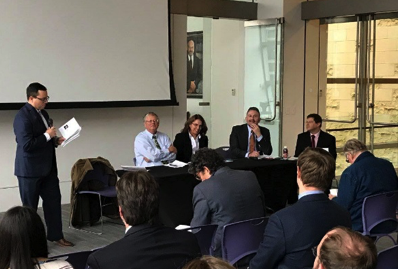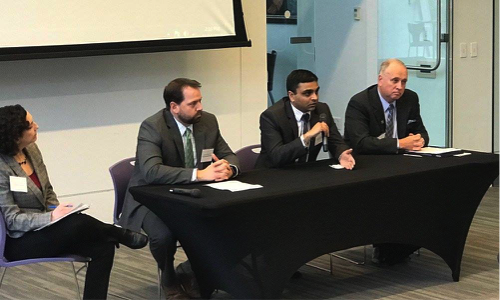
By Jason Baguet and Ben Briston, Photos courtesy of Sustainable Pittsburgh
On November 16, 2017, the Environmental Water Resource Institute Chapter (EWRI) of ASCE-Pittsburgh and Sustainable Pittsburgh’s Champions for Sustainability (C4S) came together for the 9th Annual Sustainability Conference. The conference was presented in partnership with the City of Pittsburgh Office of the Mayor and the American Public Works Association - Western Pennsylvania Chapter and included a series of seminars and panel discussions focused on “Engineering a Sustainable Economy”. The theme of the day was how Pittsburgh and other communities across the globe are positioning for greater resiliency through innovation and technology, from sustainable traffic infrastructure to smart stormwater systems.
The all-day conference was held at the August Wilson Center, and had a line-up of engineers, public works professionals, sustainability professionals, educators, and policy makers presenting forward-thinking initiatives. In the opening segment, Tom Batroney set the stage with a historical look back at previous years of sustainability, and reminded us all of the ASCE Principles of Sustainable Development in that we have to “do the right project” and “do the project right”. Rather than sprinkle green features on conventional projects, we have to properly engage all stakeholders and have the mindset to address sustainability more holistically.
The keynote speakers, John Stanton, President and CEO at the Institute for Sustainable Infrastructure and Rosanna D'Antonio, Deputy Director, Los Angeles County Department of Public Works, discussed the ENVISION Rating System, which was designed to evolve with the changing concept of sustainability, and is driving change throughout the world. John comprehensively described the ENVISION system, stating that it usually is used as a free self-assessment tool and can be a cost-efficient way to guide quality assurance and control on a project level. Cities such as Kansas City and large agencies such as New York City Transit are starting to adopt ENVISION concepts as normal practice. John stated that the Pittsburgh region needed a catalyst to embrace ENVISION as well as leaders that would accept visibility and transparency of their performance to make this a reality. It was noted that the ENVISION system can also be applied to existing infrastructure, and one local opportunity to apply the system could be for a capital bridge replacement program which considers full lifecycle replacement of structures. This may be possible with the right policy partnerships as Allegheny County owns and maintains over 500 bridges.
Rosanna D’Antonio followed John’s description of ENVISION with examples of how the system is being applied on the local level within the LA County Department of Public Works. The agency has started to use the system internally for all projects, but the county has submitted one project for verification by ENVISION and that project gained platinum status. D’Antonio summed it up best by saying, “In the past, our main focus was project delivery at the lowest cost. Today, with a focus on the environmental, economic, and social benefits of a project, i.e., the triple bottom line, we are using public infrastructure as a vehicle to improve the overall quality of life for the residents of Los Angeles County.”
 Also included during the day were two lively panel discussions, the first titled: “Sustainability and Innovation in the Pittsburgh Region.” This panel discussion included Karina Ricks, Director of the Department of Mobility and Infrastructure with the City of Pittsburgh, James Ritzman, Deputy Secretary of Planning with PennDOT, Chris Hendrickson, Director of the Traffic 21 Institute at Carnegie Mellon University, and Dan Cessna, Senior Vice President with Michael Baker International. The panel discussion focused on transportation innovation and sustainability in the Pittsburgh region. One comment that registered came from Dan Cessna, who said, “We often become engulfed in maintenance contracts and it is easier to manage change than manage crises.”
Also included during the day were two lively panel discussions, the first titled: “Sustainability and Innovation in the Pittsburgh Region.” This panel discussion included Karina Ricks, Director of the Department of Mobility and Infrastructure with the City of Pittsburgh, James Ritzman, Deputy Secretary of Planning with PennDOT, Chris Hendrickson, Director of the Traffic 21 Institute at Carnegie Mellon University, and Dan Cessna, Senior Vice President with Michael Baker International. The panel discussion focused on transportation innovation and sustainability in the Pittsburgh region. One comment that registered came from Dan Cessna, who said, “We often become engulfed in maintenance contracts and it is easier to manage change than manage crises.”
The second panel discussion included Michael Barnard, Project Director with Oxford Development Company, Daniel Bonk, Senior Engineer with Montauk Energy and Dhaval Bhalodia, Director of Asset Optimization with EverPower Wind Holdings. This panel focused on endeavors that local private companies are taking to build resilient cities and healthy, sustainable communities of the future.
 The future of smart transportation, led by Chris Hendrickson and smart water solutions, led by both Viktor Hlas, Business Team Lead with Opti Stormwater Controls and Megan Zeigler, Green Infrastructure Project Manager with Pittsburgh Water and Sewer Authority, were also topics of discussion. A highlight from the first presentation was that smart spine traffic signals could improve travel efficiency by reducing vehicle bunching and also help address air pollution. As for smart water solutions, smart valve systems could improve green stormwater infrastructure system performance by increasing storage efficiency and reducing costly maintenance of these systems.
The future of smart transportation, led by Chris Hendrickson and smart water solutions, led by both Viktor Hlas, Business Team Lead with Opti Stormwater Controls and Megan Zeigler, Green Infrastructure Project Manager with Pittsburgh Water and Sewer Authority, were also topics of discussion. A highlight from the first presentation was that smart spine traffic signals could improve travel efficiency by reducing vehicle bunching and also help address air pollution. As for smart water solutions, smart valve systems could improve green stormwater infrastructure system performance by increasing storage efficiency and reducing costly maintenance of these systems.
Students from the University of Pittsburgh and Carnegie Mellon University had the opportunity to display their research posters during breaks. Several posters were displayed ranging in topics from a Systems-level Approach for Integrated Shale Gas Produced Water Management; Sustainable Design of Carbon Nanomaterials: Decoupling the Role of Material Structure and Surface Chemistry on Electrochemical and Biological Activities; and Food-Energy-Water Nexus: Irrigation Impacts of Domestic Food Trade.
The Sustainability Conference is an annual conference focused on bringing together sustainability experts in science, engineering, and public policy. Click here to find out more about the Sustainability Committee.

